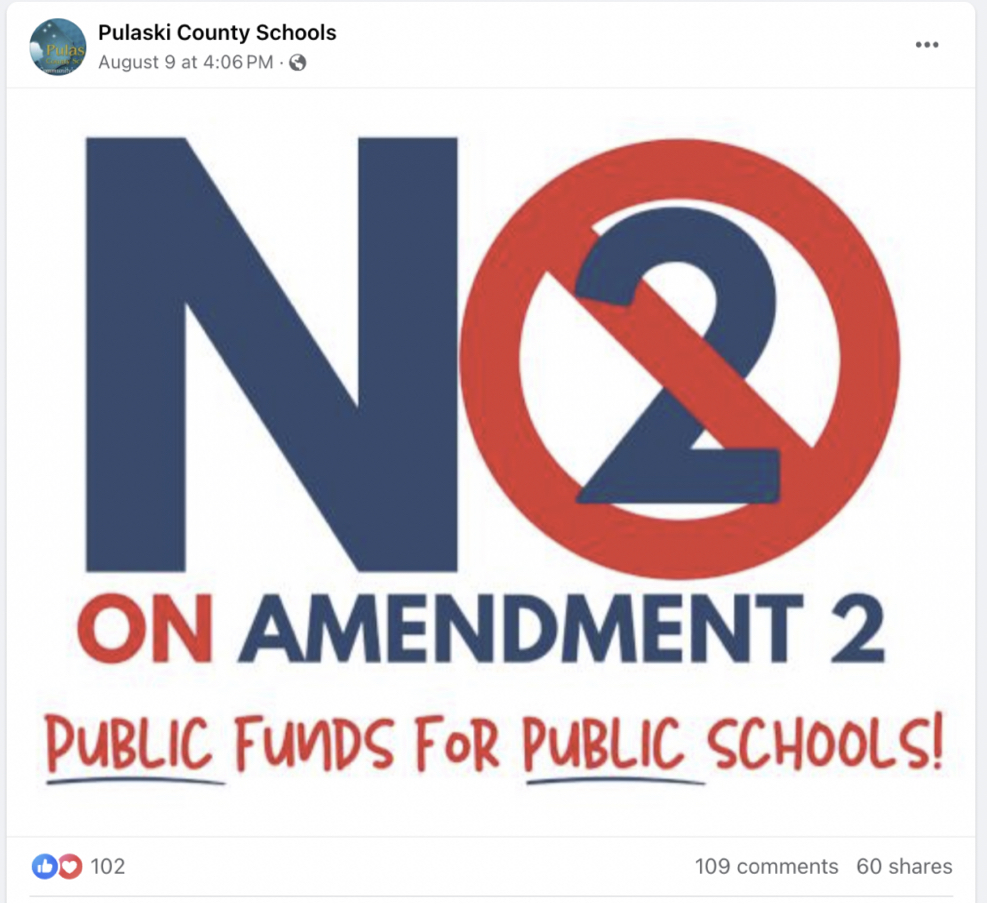
A heated debate between advocates and opponents of Amendment 2 has erupted following news that the Pulaski County Schools "shared a message advocating against Amendment 2 on its official Facebook page Friday. Similar images were on the websites of each school within the district as of Tuesday morning."
https://kentuckylantern.com/2024/08/13/kentucky-school-district-posts-a…
The news prompted open records requests to Pulaski County Schools' Board of Education members who, officials reported, "received open records requests 'for their private cell phone and devices for texts or emails discussing this issue.'"
While Kentucky Attorney General Russell Coleman has announced that he is "prepared to take any necessary action within [his office's] authority to ensure these constitutional and statutory limitations [prohibiting the use of public resources in connection with the pending ballot questions] are upheld," he cannot offer the same assurances of enforcement to the open records requesters seeking board members' "texts or emails discussing this issue" on private cell phones and devices.
https://www.kentucky.gov/Pages/Activity-stream.aspx?n=AttorneyGeneral&p…
As recently as May, 2024, Coleman determined in an open records appeal that the University of Kentucky did not violate the open records law "when it denied a request to inspect text messages on privately-owned devices because the request did not seek records prepared, owned, used, in the possession of, or�retained by the University."
https://www.ag.ky.gov/Resources/orom/2024-OROM/2024/24-ORD-118.pdf
Coleman's May 2024 open records decision echoed the position his predecessor took in 2021 when he affirmed the Kentucky Department of Fish and Wildlife Resources Commission's denial of sportsman Brian Mackey's request for public records generated on commissioners' private cell phones and private email servers relating to specific commission business during an identified timeframe.
https://www.ag.ky.gov/Resources/orom/2021/21-ORD-127.pdf
It is the same issue that the Kentucky Open Government Coalition subsequently raised in the Franklin Circuit Court and that is now under review by the Kentucky Supreme Court following a Kentucky Court of Appeals opinion holding:
"Records used or prepared by an agency fall within the scope of the Open Records Act regardless of where the record is stored. A possession only approach does not comport with the plain language of KRS 61.870(2) or the general purpose of the Open Records Act․
․
"[E]mails sent or received via the Commissioners’ personal email accounts concerning state business are 'prepared' and 'used' by the Commission, therefore placing the emails at issue within the purview of the Open Records Act, absent an exception applying."
https://caselaw.findlaw.com/court/ky-court-of-appeals/115372886.html
Until the issue is finally decided by Kentucky's highest court, the Attorney General is determined to adhere to the position the Court of Appeals expressly rejected.
Thus, supporters of Amendment 2 will be disappointed to learn that the Pulaski County Board of Education has a legal basis for denying their pending requests for board members' emails and texts about Amendment 2 -- exchanged "on private cell phones and devices" -- based on open records decisions issued by Attorneys General Cameron and Coleman, the most recent in May of this year.
Should the Board of Education deny these pending open records requests on this basis, and the aggrieved requesters elect to pursue an open records appeal to the Kentucky Attorney General, Coleman must affirm the Board of Education's denial of the requests to ensure consistency with 21-ORD-127 and its progeny -- up to and including 24-ORD-118.
Under the Attorney General's position, the requesters must lose their appeals and the Board of Education must win.
The Kentucky Open Government Coalition stands firm on our position that electronic communications exchanged by public officials on their private devices and accounts, that relate to district business (including the decision to use social media to oppose Amendment 2) and that do not qualify for nondisclosure under one or more of the statutory exceptions to the open records law are open, public records. They must be disclosed.
A uniform standard of accountability must be applied to all public agencies, their officials, and their employees regardless of the position the requester takes on a public issue or the popularity -- or unpopularity -- of the cause.
